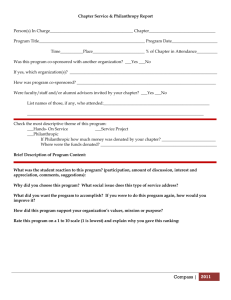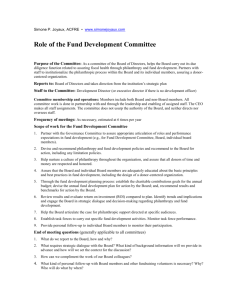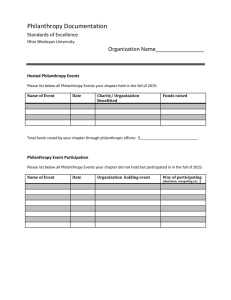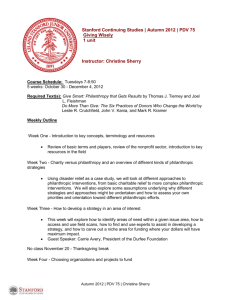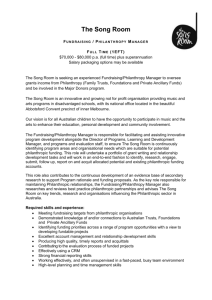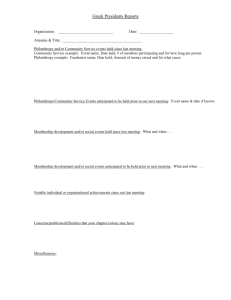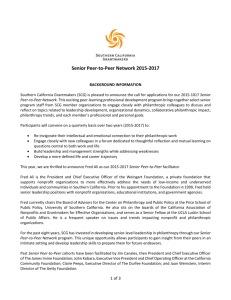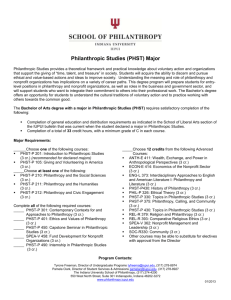philanthropy courses
advertisement
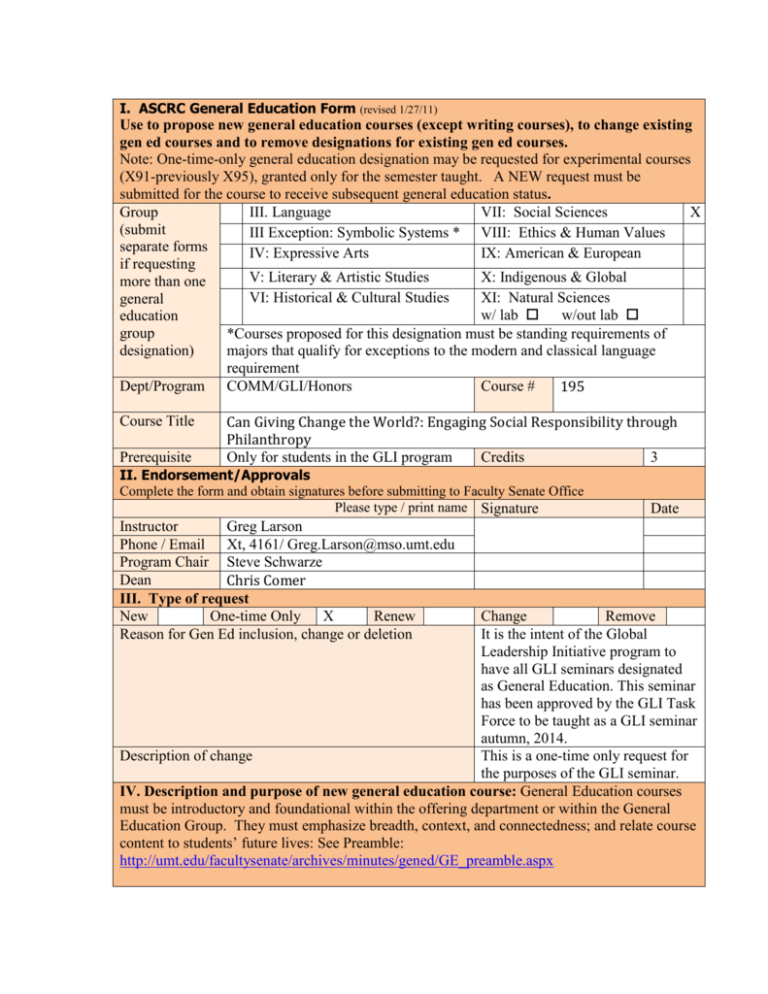
I. ASCRC General Education Form (revised 1/27/11) Use to propose new general education courses (except writing courses), to change existing gen ed courses and to remove designations for existing gen ed courses. Note: One-time-only general education designation may be requested for experimental courses (X91-previously X95), granted only for the semester taught. A NEW request must be submitted for the course to receive subsequent general education status. Group III. Language VII: Social Sciences X (submit III Exception: Symbolic Systems * VIII: Ethics & Human Values separate forms IV: Expressive Arts IX: American & European if requesting V: Literary & Artistic Studies X: Indigenous & Global more than one VI: Historical & Cultural Studies XI: Natural Sciences general w/ lab w/out lab education group *Courses proposed for this designation must be standing requirements of designation) majors that qualify for exceptions to the modern and classical language requirement Dept/Program COMM/GLI/Honors Course # 195 Course Title Prerequisite Can Giving Change the World?: Engaging Social Responsibility through Philanthropy Only for students in the GLI program Credits 3 II. Endorsement/Approvals Complete the form and obtain signatures before submitting to Faculty Senate Office Please type / print name Signature Instructor Greg Larson Phone / Email Xt, 4161/ Greg.Larson@mso.umt.edu Program Chair Steve Schwarze Dean Chris Comer III. Type of request New One-time Only X Renew Reason for Gen Ed inclusion, change or deletion Date Change Remove It is the intent of the Global Leadership Initiative program to have all GLI seminars designated as General Education. This seminar has been approved by the GLI Task Force to be taught as a GLI seminar autumn, 2014. Description of change This is a one-time only request for the purposes of the GLI seminar. IV. Description and purpose of new general education course: General Education courses must be introductory and foundational within the offering department or within the General Education Group. They must emphasize breadth, context, and connectedness; and relate course content to students’ future lives: See Preamble: http://umt.edu/facultysenate/archives/minutes/gened/GE_preamble.aspx This proposed course examines the relationship between the individual and society by addressing the question: How do individuals and organizations address pressing and enduring social problems to create meaningful change? Through the lens of philanthropy, this course introduces students to social responsibility and some of the big problems facing society. As individuals and organizations attempt to address these problems and enact social change to create a more just and equitable world, philanthropic and innovative giving strategies are more commonly being used. This class will focus on the growing philanthropic movement at local, national and global levels to combat the most pressing contemporary challenges facing society such as poverty, environmental degradation, and disease. Students will learn about the strengths and limitations of philanthropy as one model for addressing contemporary social problems, and in doing so, better understand the overall challenges related to enacting social change. COMM 195 is designed as an experiential learning opportunity for students to study and engage in philanthropy as a tool for social change and community engagement at local and global levels. In this course, students will study and critique how innovative philanthropists and social entrepreneurs support social change and influence public policy to tackle complex, critical global issues. In doing so, students will engage the continuing search to find the most innovative and effective ways to organize, communicate and allocate resources to solve social and environmental problems. V. Criteria: Briefly explain how this course meets the criteria for the group. See: http://umt.edu/facultysenate/documents/forms/GE_Criteria5-1-08.aspx 1. Systematically study individuals, Students will study the ways in which groups, or social institutions; nonprofit organizations shape community life and contribute to transformational social change, and the models of partnership and collaboration among nonprofit organizations with philanthropists, government and businesses. 2. Analyze individuals, groups, or social Students will learn about community needs problems and structures; and/or and how to critically analyze them in the context of resource development and allocation. 3. Give considerable attention to ways in Students will engage in a philanthropic which conclusions and generalizations experience to gain a deeper understanding of are developed and justified as well as societal issues, encourage leadership, critical the methods of data collection and thinking, and effective communication. They analysis. will collect data about community needs, analyze proposals and make funding decisions about where to allocate resources. VI. Student Learning Goals: Briefly explain how this course will meet the applicable learning goals. See: http://umt.edu/facultysenate/documents/forms/GE_Criteria5-1-08.aspx 1. Describe the nature, structure, and historical development of human behavior, organizations, social phenomena, and/or relationships; 2. Use theory in explaining these individual, group or social phenomena; and/or 3. Understand, assess, and evaluate how conclusions and generalizations are justified based on data. Students will learn about philanthropy including the history, purposes, and models of philanthropy to engage in social change at local and global levels; from small-scale individual donations to complex multibillion dollar donations. Students will learn theories related to philanthropy, organizational communication and non-profit management including specific theories related to leadership, organizational structure, conflict, change and decision making that are central to understanding social change and philanthropic organizations. Students will engage in critical reflection on models of social change and the role of philanthropy in society including the ways in which wealth, power and influence philanthropic organizations and, subsequently, the public agenda. In addition, students will engage in a guided experiential learning project where they will have opportunities to research community needs, develop a call for proposals for local non-profits and evaluate those proposals according to a set of criteria. VII. Justification: Normally, general education courses will not carry pre-requisites, will carry at least 3 credits, and will be numbered at the 100-200 level. If the course has more than one pre-requisite, carries fewer than three credits, or is upper division (numbered above the 200 level), provide rationale for exception(s). The course is a three credit freshman seminar accepted as a GLI course for Fall 2014. Although the course is designated as an honors course, it is open to all freshmen in the GLI program. VIII. Syllabus: Paste syllabus below or attach and send digital copy with form. The syllabus should clearly describe how the above criteria are satisfied. For assistance on syllabus preparation see: http://teaching.berkeley.edu/bgd/syllabus.html COMM 195: Can Giving Change the World?: Engaging Social Responsibility through Philanthropy. 3 credits A Global Leadership Initiative Freshmen Seminar, Autumn 2014 Instructors: Dr. Greg Larson, Associate Professor, Communication Studies Greg.Larson@mso.umt.edu, 243-4161, LA 357 Dr. Andrea Vernon, Director, Office for Civic Engagement Andrea.vernon@mso.umt.edu , 243-5159, DHC 015 SYLLABUS Seminar Overview This course examines the relationship between the individual and society by addressing the question: How do individuals and organizations address pressing and enduring social problems to create meaningful change? Through the lens of philanthropy, this course introduces students to social responsibility and some of the big problems facing society. As individuals and organizations attempt to address these problems and enact social change to create a more just and equitable world, philanthropic and innovative giving strategies are more commonly being used. The seminar will focus on the growing philanthropic movement at local, national and global levels to combat the most pressing contemporary challenges facing society such as poverty, environmental degradation, and disease. You will learn about the strengths and limitations of philanthropy as one model for addressing contemporary social problems, and in doing so, better understand the overall challenges related to enacting social change. COMM 195 is an experiential learning opportunity for you to study and engage in philanthropy as a tool for social change and community engagement at local and global levels. In this course, you will study and critique how innovative philanthropists and social entrepreneurs support social change and influence public policy to tackle complex, critical global issues. In doing so, you will engage the continuing search to find the most innovative and effective ways to organize, communicate and allocate resources to solve social and environmental problems. This course uses a multidisciplinary lens to explore models of philanthropy and their impact on social change, drawing from communication studies, nonprofit administration, sociology, critical management studies, and economics. Complex social problems need to be studied from multiple disciplinary approaches. For example, one cannot adequately study poverty without delving into its roots in economic, political, and social policy. In addition, adequate means of communication are critical for not only understanding the problems themselves, but also for organizing to create changes. Course Goals Communication 195 will: 1. Teach students about philanthropy including the history, purposes, and models of philanthropy to engage in social change at local and global levels; from small-scale individual donations to complex multi-billion dollar donations. 2. Introduce students to the ways in which nonprofit organizations shape community life and contribute to transformational social change, and the models of partnership and collaboration among nonprofit organizations with philanthropists, government and businesses. 3. Challenge students to engage the ways in which wealth, power and influence shape philanthropic organizations and, subsequently, the public agenda. As the wealth gap in the United States and around the world increases, students will explore the benefits, costs and consequences of wealthy philanthropists and philanthropic organizations as key sources for addressing social problems. 4. Provide students with sources of information about community needs and how to critically analyze them in the context of resource development and allocation. 5. Provide students with a philanthropic experience to gain a deeper understanding of societal issues, encourage leadership, critical thinking, and effective communication. 6. Introduce students to successful corporate philanthropists and social entrepreneurs through guest speakers from the wider Missoula and Montana community who will speak about their experiences first-hand. 7. Present students with the opportunity to build self-awareness and develop their own sense of citizenship in the 21st Century global society. 8. Emphasize the use of excellent communication skills, both in writing, presenting, and interactions with community organizations and in-class panels. Students will speak in front of the class and/or in small groups, complete writing assignments, and will communicate with community partners. Learning Outcomes At the end of this course, students will be able to: 1. Identify strategies in which individuals, foundations and corporations engage in philanthropic giving to address social problems and effect social change locally and globally. 2. Understand and critique the role of philanthropy and the nonprofit sector in society and the economy. 3. Understand the impact of community service and grant-making on community organizations’ strategies for meeting needs and creating sustainable social change. 4. Identify strategies and critique methods philanthropists use to organize, communicate, and enable social change. 5. Understand critical debates and ethical issues surrounding philanthropy and develop an informed opinion about these issues. 6. Understand the community-based philanthropic grant-making processes. 7. Demonstrate communication skills for interacting in professional settings, making presentations to professional audiences, and relating philanthropic ideas that connect with other courses, individual career aspirations, global citizenship, and personal areas of one’s own life. Attendance/Punctuality/Participation You are expected to attend class every day and to come to class on time. As much of the work in this class is reading, your attendance each class period to discuss and debate the readings is essential to the success of the course. In addition, much of the organizing work on the philanthropic experiential learning project will take place in class, so your attendance is essential. You will receive a grade for your attendance and participation in daily class discussions. Unexcused absences and tardiness will result in the loss of participation points. Cell phone use (text messaging) is not allowed in class. Special Assistance If some extenuating circumstances beyond your control prevent you from meeting your expectations for your attendance and performance, we expect you to contact us immediately. It is important that you contact us sooner rather than later. Notice to Students with Documented Disabilities We encourage students with disabilities, including but not limited to, chronic diseases, learning disabilities, head injury and attention deficit/hyperactive disorder, to discuss with one or both of us, after class or during my office hours, appropriate accommodations that might be helpful to you. Due Dates A late written assignment will be penalized one full grade for each day it is late unless arrangements are made with me ahead of time. Presentations must be delivered on the day that they are due. Backup Copies You are responsible for keeping back-up copies of all work that you do for the class. Academic Honesty All students must practice academic honesty. Academic misconduct is subject to an academic penalty by the course instructor and/or disciplinary sanction by the University. All students need to be familiar with the Student Conduct Code. The Code is available for review at http://life.umt.edu/vpsa/student_conduct.php Course readings and assignments: Throughout this course, students will engage in readings, discussions, and community interaction that will consistently expose them to various disciplinary perspectives on social problems and philanthropic means to address them. Reading materials and assignments will be drawn from: - Philanthrocapitalism: How Giving Can Save the World by Matthew Bishop and Michael Green, Bloomsbury Press, 2009. - The Revolution Will Not Be Funded: Beyond the Non-Profit Industrial Complex edited by INCITE! Women of Color Against Violence. - Inspired Philanthropy by Tracy Gary,Jossey-Bass, 2008 - We Gave Away A Fortune: Stories of People Who Have Devoted Themselves and Their Wealth to Peace, Justice, and the Environment, by Christopher Mogil, Anne Slepian, and Peter Woodrow, New Society Publishers, 1992. -David Bornstein, How to Change the World: Social Entrepreneurs and the Power of New Ideas. Oxford: Oxford University Press, 2004 - Enterprising Nonprofits: A Toolkit for Social Entrepreneurs by J. Gregory Dees, Jed Emerson, and Peter Economy. John Wiley and Sons, 2001. - The Hidden Costs of Million Dollar Donations, by Robin Rogers in The Washington Post (December 30, 2011) -Qualitative Communication Research Methods by Thomas Lindlof and Bryan Taylor, 2002. The experiential philanthropic project is a center piece of the course. The philanthropic project is funded by the Learning by Giving Foundation. UM is one of 26 universities (including UC Berkeley, USC, Tufts, Cornell, Columbia, and Brandeis) across the country funded by this unique foundation to support courses that educate the next generation of philanthropic leaders. The experiential philanthropic project will engage students in learning about community needs, issuing a request for proposals to the public, reviewing real proposals from local nonprofit organizations, and debating the merits of each proposal before collectively making final funding decisions to allocate $10,000 in the Missoula community. Grants of at least $2,000 each will then be used by local Missoula nonprofits to further their missions. This project is a unique and impactful opportunity for you to explore theoretical concepts in relationship to practice as you engage in your community as grant-makers. This experience has the potential to be one of the most memorable academic experiences for you and can help set the path for you to become leaders around campus in engaging issues of social responsibility. Requirements of the Course/Grading Assignment Points Available Participation 50 Presentation on class readings 50 Community Needs Assessment & Critique 100 Grant-making Project 100 Final Reflection Paper & Presentation 100 Total Points 400 Letter grades are figured as follows: A = Outstanding - goes beyond expectations B = Good - above average C = Satisfactory - meets minimum requirements D = Unsatisfactory - does not meet some requirements F = Failing -- Does not meet requirements Grade A Percent 100-93% A- 92-90% B+ 89-88% B 87-83% B- 82-80% C+ 79-78% C 77-73% C- 72-70% D+ 69-68% D 67-63% F Below 63% Class Outline Weeks 1-4: Philanthropy in the Context of Social Problem Solving and Social Justice. Curriculum will focus on introducing students to these concepts and examining models of implementation through reading assignments and guest speakers to create a strong foundation of understanding that will guide the rest of the semester. Students will be introduced early on to some of the strengths and limitations of philanthropy as a model for addressing social problems. Assignments primarily consist of reading materials and discussion questions. Students will be placed into small groups and be assigned to do a short presentation of one of the reading assignments and facilitate a class discussion on the reading. Weeks 5-8: Analyzing Social Problems and Building a Critical Perspective. Curriculum will focus on researching and understanding social problems in our community, state, nation, and the world. Students will analyze the most pressing problems and parse out those in which students have a strong connection to and desire to invest grant funds in. Students will conduct library research to understand social problems and hear from the local United Way to learn about local community needs. Assignments will consist of researching community needs and critiquing philanthropic models that address needs. This section of the course will culminate in the Community Needs assignment in which the students prioritize which local needs they will consider funding for. Weeks 9-13: Engaging in the Philanthropic Process. Curriculum will engage students in the experiential philanthropic process. Students will build a Request for Proposals document, issue it to the public and market the grant opportunity to local nonprofit organizations, receive proposals, and develop their protocol for proposal review and final decision making. The course instructors will facilitate, guide, and support each of these steps of the philanthropic process providing enough support to ensure students feel confident in their choices and practices, but also allowing for students to be engaged learners with some autonomy to also create and guide the process themselves. Weeks 14-15: Assessing Impact through Reflection and Celebration of Success Curriculum will focus on the analysis of the grantmaking process. Students will learn about various strategies used by philanthropists and organizations to evaluate programs and assess impacts of philanthropic investments designed to meet critical community needs and sustain social change. Students will write reflection papers to capture and demonstrate the learning outcomes they achieved in the course, and to develop and describe their own personal values and ideas about philanthropy and engaged citizenship in the 21st Century. The instructors will provide students with writing prompts for reflection and students will present components of their reflection papers to the class. The final class will be the official Awards Ceremony in which all of the funded organizations will attend and students will present them with their grant checks. Please note: Approved general education changes will take effect next fall. General education instructors will be expected to provide sample assessment items and corresponding responses to the Assessment Advisory Committee.
